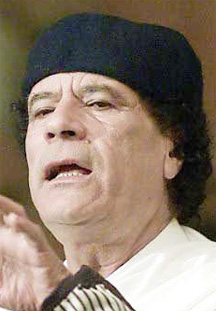DOHA/TRIPOLI, (Reuters) – A group of Western powers and Middle Eastern states called for the first time on Wednesday for Muammar Gaddafi to step aside, but NATO countries squabbled publicly over stepping up air strikes to help topple him.

In a victory for Britain and France, which are leading the air campaign in Libya and pushed for an unequivocal call for regime change, the “contact group” of European and Middle Eastern nations, plus the United Nations, the Arab League and the African Union, said Gaddafi must go.
“Gaddafi and his regime has lost all legitimacy and he must leave power allowing the Libyan people to determine their future,” a final statement obtained by Reuters said.
It also said the rebels’ national council, “in contrast with the current regime … is a legitimate interlocutor, representing the aspirations of the Libyan people”.
The wording was much tougher than at a conference two weeks ago and gave stronger backing to insurgents fighting to end Gaddafi’s 41-year rule. Participants would work on a financial mechanism to help rebels run the eastern region they control.
The group also agreed to provide “material support” for the rebels. Although the statement did not give details, diplomats said some nations might interpret this as supplying arms — a key request of the outgunned insurgents.
Material support could include “all the other needs, including defence equipment”, said Prime Minister Sheikh Hamad bin Jassim al-Thani of Qatar, a leading Arab supporter of the month-old revolt inspired by uprisings in Tunisia and Egypt.
A French presidential source said Paris had no plans to arm the rebels, although it would not oppose other countries if they decide to do so. President Nicolas Sarkozy discussed Libya with visiting British Prime Minister David Cameron.
Britain said yesterday it would supply 1,000 sets of body armour from surplus British defence supplies to Libyan rebels, on top of the 100 satellite phones already sent.
The rebels said they were in talks with “friendly” countries to obtain arms: “I don’t think there will be a problem getting weapons,” national council spokesman Abdel Hafiz Ghoga told reporters in the rebel stronghold of Benghazi.
FIGHTING
At Ajdabiyah on the eastern front, rebels said they were exchanging rocket fire with Gaddafi’s forces from a point about 40 km (25 miles) east of the government-held oil port of Brega. Rebels reported more heavy fighting in Misrata, their main bastion in western Libya, and said they were making progress against forces besieging the city, pushing them back 10 km in one area. It was not possible to verify the claim.
A rebel sympathiser in Misrata named Ghassan said rebels had pushed back government forces on its central Tripoli Street.
“After they withdrew they fired artillery at the Al-Bira neighbourhood, which lies in the centre near Tripoli Street,” he said. “We haven’t been able to reach the hospital to check whether there were any people killed or injured.”
A rebel spokesman called Abdelrahman told Reuters fighters had attacked pro-Gaddafi forces on a hill west of Zintan, the rebels’ other redoubt in the west.
“The main problem in Zintan is fuel shortages. There are also water shortages and electricity is not always available.”
Libyan television said NATO planes had bombed Misrata and Gaddafi’s birthplace of Sirte. A NATO official said there were no strikes in either city, but the alliance had hit anti-aircraft weapons about 24 km south of Misrata.
The World Food Programme said Libya was facing a humanitarian crisis and United Nations Secretary-General Ban Ki-moon told the Doha meeting that up to 3.6 million people, or more than half the population, could need assistance.
Libya’s Planning and Finance Minister Abdulhafid Zlitni told a news conference in Tripoli $120 billion of Libyan assets had been frozen by foreign banks under sanctions, but the country still had reserves in gold and other assets. There were “no legal grounds” for diverting Libyan assets to rebels, he said.
DIVISIONS
While there was agreement in Doha on the principle of removing Gaddafi, there were divisions over how to proceed.
British Foreign Secretary William Hague called for more alliance members to join attacks on ground targets and his French counterpart, Alain Juppe, called for heavier military pressure on Gaddafi’s troops to convince him to leave power.
But Belgian Foreign Minister Steven Vanackere said the March 17 U.N. resolution authorising NATO action in Libya — to protect civilians from Gaddafi’s government forces — ruled out arming civilians and he saw no need to boost air power there.
Britain and France, western Europe’s two main military powers, are delivering most of the air strikes on Gaddafi’s armour.There is increasing frustration in Paris and London that air strikes have neither tipped the balance of the war in favour of the rebels nor ended devastating shelling of Misrata.
NATO’s high-flying aircraft are running out of targets they can hit without endangering civilians, experts say. Some argue that the United States could tip the balance with weapons like the A-10 “tankbuster” plane and helicopter gunships, but Washington is reluctant to be drawn more deeply into the war.





